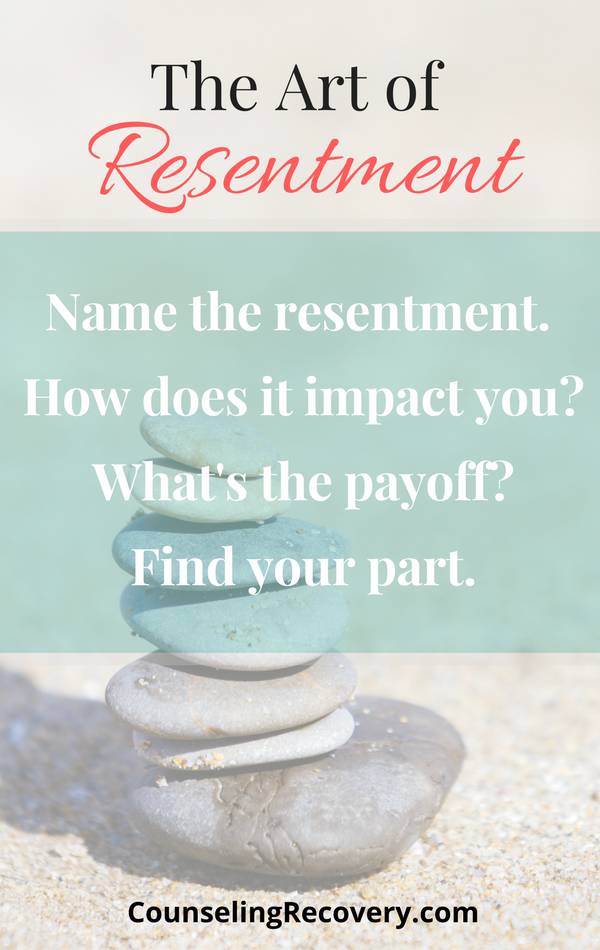The Art of Letting Resentments Go
Susan prepares for weeks to create the perfect meal for her family but no one notices her efforts. She thinks to herself, "No one bothers to ask what I want."
"John never saw his father at Christmas because his dad was with his "new family." Now his dad is alone and expects to be included in the holidays.
Resentments are often the start of relationship problems. Holding in hurt feelings in hopes that they will disappear on their own is a common but false belief.
People who struggle with resentments don't want to admit how they really feel because...
They think why bother, it's silly.
They don't want to hurt someone else's feelings.
They’d rather avoid a potential conflict.
Letting go of resentments start when you realize the price you’re paying for keeping them. Only then are you ready to do something different!
First, it’s important to admit that they are benefits to harboring resentments. Ask yourself What are you getting out of it?
There are two ways people harbor resentments.
Not admitting that they are still upset.
Keeping the resentment alive by telling the story again and again.
If you are holding onto resentments, you need to find out why.
There is a benefit you're getting from the resentment which makes it hard to let it go. For instance, does the resentment give you an entertaining story to tell or a sympathetic ear? Does it give you energy? Do you like being right about it?
Letting resentments go
Step 1. Write It Out.
The first step in healing resentments is writing it out. This helps clarify what's really bothering you. Here are some tips to get started.
What you do resent and why?
What are you getting out of the resentment?
How would it benefit you to let it go?
How is the resentment harming you?
Step 2. How does this impact you?
Once you understand what the resentment is costing, you'll be more motivated to change it.
Does this resentment:
Create distance in the relationship?
Increase your stress?
Affect your attitude?
Impact your self-esteem?
When telling the same resentment story gets old, it's probably time to change it!
Carrying resentments takes energy. At some point you'll get sick and tired of feeling that stress and anger. It's called hitting a bottom.
Step 3. Find your contribution!
This is where the rubber meets the road. Write out how have you contributed to the situation.
There are 2 ways to contribute to a resentment.
Anything said or done before the incident.
Your response to the incident.
Ask yourself...
What was your reaction to the event?
Did you ignore the person or make it worse by gossiping about them?
Did you do anything to retaliate?
Did you do anything indirectly to hurt them?
If you are willing to looking at your behavior, the answers will come and so will your integrity!
Step 4. Decide your next steps.
Do you need to address the incident directly? If so, stick to the facts and focus on what upsets you. Try not to make assumptions or attack their character. Those tactics get things going in the wrong direction.
The more you express yourself without blame, the better the outcome. People get defensive quickly when they're expecting a fight.
The Indirect Route
If contacting that person isn't healthy or they are deceased, writing a letter of closure can be healing. Tell them what you needed that you didn't get. Acknowledge your part however small. Sometimes, burning the letter afterwards helps to let it go.
Another option is to practice detaching with love. This concept is taken from Al-Anon, a 12 step program that helps friends and families of alcoholics.
Detachment is when you can let go of the other person's behavior. For more on how to detach read Detachment for Surviving Addiction.
How to Reconnect
Once you've identified your part in the resentment, it gets easier to feel empathy towards the other person. If this is still difficult, focus on what you can do to control your attitude.
Other ways to handle resentment include:
Pray for the person you resent.
Try to see the situation from their perspective.
Show grace by not losing your cool.
Act as if by smiling. You can't fake a smile even if it's forced.
Focus on the present and leave the past alone.
When you're struggling with a resentment, honoring how you feel is most important. Being polite makes you good look but let's face it, healing the resentment means you can finally move on!



